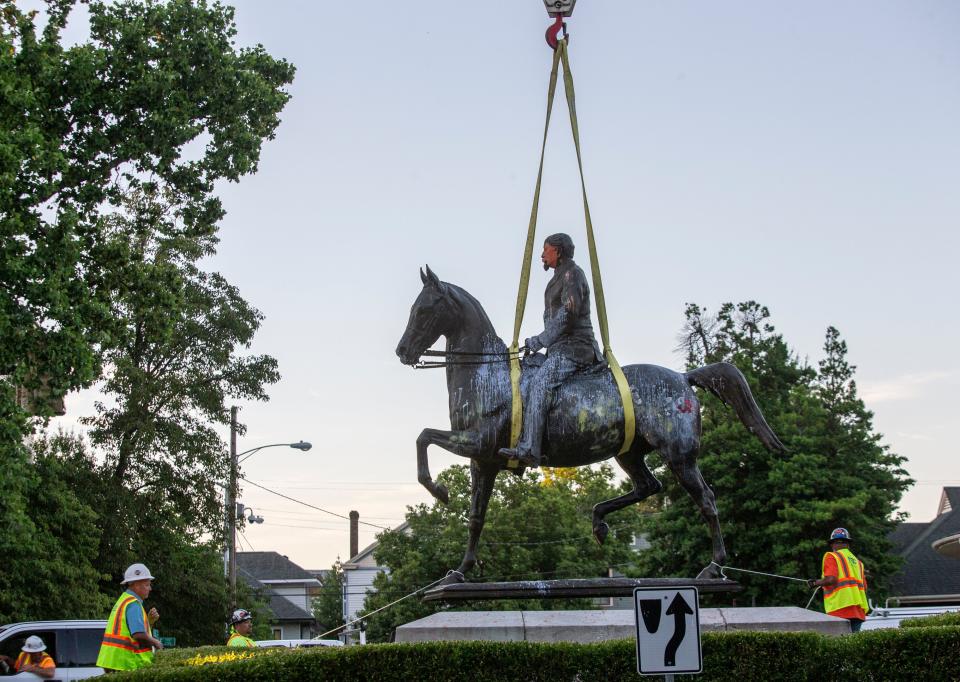Kentucky Supreme Court mulls ruling on Castleman statue as both sides make their case
The Kentucky Supreme Court heard oral arguments Thursday from the two sides at the center of a case that seeks to bring back the controversial John B. Castleman statue to Louisville's Cherokee Triangle neighborhood.
The Friends of Louisville Public Art, a not-for-profit group formed in 2019 to try to save the controversial monument, and other plaintiffs believe the previous decision from the city's landmarks commission to remove the statue lacked due process and was tainted because several members had been appointed by then-Mayor Greg Fischer, who had called for its removal and described it as a symbol of the "horrific and brutal slavery of men, women and children."
The John Castleman story:Was John Castleman a racist whose statue deserves to come down?
On the other side, the Jefferson County Attorney's Office, representing the city and its Historic Landmarks and Preservation Districts Commission, argues the commission's decision was fair and that merely having the "appearance of impropriety" is not enough to overturn an administrative body's decision.
Each side now awaits a decision from the Supreme Court at an undetermined date.
The 15-foot-high bronze statue of Castleman atop a horse stood in the middle of the roundabout at Cherokee Road and Cherokee Parkway for 107 years until crews removed it in June 2020.
The move came after the city's landmarks commission decided in 2019 to overturn a tie vote from the Cherokee Triangle Architectural Review Committee to keep it in place and a Jefferson Circuit Court judge denied an appeal from Friends of Louisville Public Art to keep Castleman standing.
The statue was moved to storage in 2020 and is intended to go to Cave Hill Cemetery, where Castleman is buried.

Castleman and his legacy drew mixed reactions over the years from residents and historians. He was a Confederate officer but later commanded the Louisville Legion, the forerunner of the Kentucky National Guard, and served as a brigadier general for the U.S. Army in the Spanish-American War.
In 1916, Castleman renounced the Confederate cause and extolled President Abraham Lincoln, who had spared his life after he was arrested as a spy for the South during the Civil War. Castleman died in 1918 at the age of 76.
As head of Louisville's park system for over two decades, Castleman fought against attempts to exclude Black residents from entire parks. The statue featuring him in civilian, not military, clothing and the horse was a nod to how he also helped start the American Saddlebred Association and served as its first president.
Still, some argued the statue was divisive and a tribute to someone who fought for the Confederacy.
The state Supreme Court agreed last June to hear the lawsuit seeking to restore the statue. The suit argues the city officers who voted to take down the statue in 2019 were "biased" and "partial."
"Due process was not present in this process," the lawsuit says, arguing two of the commissioners, Emily Liu and Robert Kirchdorfer, who voted to take down the statue, along with one Fischer appointee on the Architectural Review Committee, David Marchal, had conflicts of interest.
For subscribers:'We were treated as enemies': DOJ report shows police violated protesters' rights
Attorney Steve Porter, who is representing the plaintiffs and has also represented residents in numerous development-related cases over the years, such as the high-profile TopGolf debate, told the court on Thursday that no "public officer hired by the mayor would admit, ‘Yes, I have a conflict,'" referring to the landmarks commission members whom Fischer appointed.
Porter also said, in response to a question from Justice Kelly Thompson, he is not arguing a mayor should lose the ability to appoint members to commissions but that appointees "must step aside" in cases where the mayor, for example, takes a stance on a matter before the body, as Fischer did with the Castleman statue.
Porter's co-counsel, Gerald Toner, also told the justices that if the landmarks commission chair at the time, Chris Hartman, had tossed the Castleman statue case back to the Cherokee Triangle Architectural Review Committee (ARC) to issue "findings of fact" after initially reaching a deadlock in a tie vote, "the sham that occurred would have been avoided, and we wouldn’t be here today."
Assistant Jefferson County Attorney David Sexton was asked by Chief Justice Laurence B. VanMeter about a 2005 Kentucky Supreme Court decision in a case where a company, Hilltop Basic Resources Inc., sought to mine underground limestone in a rural area of Boone County that was not zoned for subsurface mining.
VanMeter, noting the two landmarks commission members were at-will employees whom Fischer could fire, quoted part of the Supreme Court's opinion in the Hilltop case that said "decisions tainted by conflicts of interest or blatant favoritism are also prohibited as arbitrary."
"You don’t think voting in favor of your employer ... is an appearance of impropriety?" VanMeter asked Sexton, referring to the landmarks commission members appointed by Fischer.
A Louisville legacy:How Felton Spencer impacted lives on his journey to basketball stardom
Sexton said it the commission's 5-3 vote that paved the way for the statue's removal was supported by the facts at hand and that an administrative decision cannot get overturned only due to "an appearance of impropriety."
Seeming to recognize the legal and procedural complexity that defined the Castleman statue debate, other justices, including Michelle Keller and Angela McCormick Bisig, tried to get clarity from the two sides on whether the ARC or landmarks commission ever really came up with findings on the "full merits" of the monument.
Sexton said the "tie vote legally was a denial of the application."
Porter, on the other hand, argued Hartman tried “to bully the commission into reaching a decision without fully discussing the issues surrounding the statue."
Reach Billy Kobin at bkobin@courierjournal.com
This article originally appeared on Louisville Courier Journal: Kentucky Supreme Court hears arguments on Louisville Castleman statue

